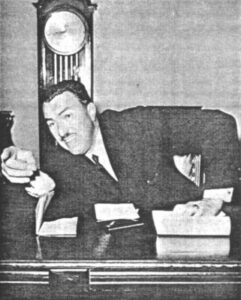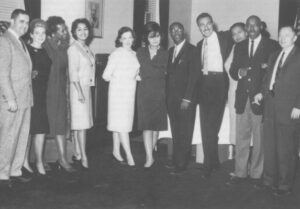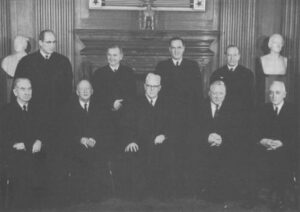Editors Note: APF Reporter Vol.11 #3 exsisted only as a photo copy, becuase of this the pictures in this story are of poor quality.
They were not reckless with merriment, nor did they much tolerate those who were. Members, of the Eisenhower administration were much like Eisenhower himself, businesslike, plain, steady. No need to look before they jumped because they rarely jumped. Congressman Adam Clayton Powell was everything they were not; he lived to shock.
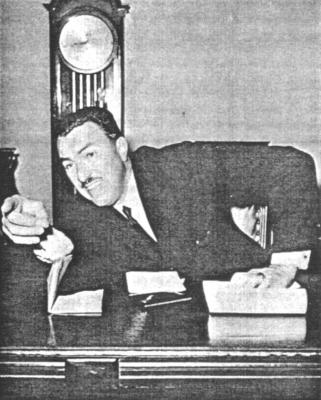
One afternoon Powell called the White House and got Sherman Adams on the line. Powell told Adams he was convening an important meeting in Harlem the following Saturday and the White House must send someone. Adams turned to Fred Morrow, a special assistant to Eisenhower.
Fred Morrow was a graduate of Bowdoin College. He had worked for years at CBS before joining the administration. With his blue-blood credentials, he became the first black professional to work on the White House staff. He was a serious man in a serious administration. Adams sent Morrow to Harlem to meet with Powell.
Morrow stepped out of the taxi, knocked on the door at Frank’s, a restaurant where the meeting was being held. Powell answered the door, recalls Morrow. The Congressman was grinning; the drink in his hand was a martini. Powell, head cocked back, yelled to friends behind partitions to come out. “I may be a Democrat,” he said, “but I still got Republicans who’ll listen.”
Morrow, who had been duped, who had been the Eisenhower body for Powell to prove to his friends that when he said “jump” to the administration, it jumped, did a slow burn. “Aw man,” Powell said, slapping him on the back, “Relax, have a drink.”
For Powell, politics was life with the curtains thrown back. It was wonderful, crafty, honest, not so honest, warm honey everywhere, and cold-blooded; it was politics. He was a New Yorker and everything that that meant. The Eisenhower crowd found him hard to figure and puzzling. Sherman Adams had once been on vacation, in Germany, floating down the Rhine, in the middle of nowhere, when he looked up on a hillside, and right there, on a blanket, with both picnic basket and beautiful lady, was Adam Clayton Powell. Sherman Adams got a kick out of telling the story to colleagues.
By the time Eisenhower had come in to office in 1953, Powell, already a four-term Congressman, was the best known civil rights spokesman in America. Launching one-man investigations into charges of segregation and discrimination, he swept into cities. Calm and professorial at the news conferences, fiery in the church pulpit, the preacher in him kicking the congressman aside when the audience was the kind of audience he had grown up with. There was no black matinee idol from Hollywood in America in the early 1950’s; there was only Adam Clayton Powell, Jr..
On June 3, 1953, Eisenhower’s honeymoon abruptly ended. Powell, having been made aware of continued segregation on military bases, dashed a telegram to the president. “The hour has arrived for you to decisively assert your integrity. You cannot continue to stand between two moral poles,” Powell said. He charged that there was continued segregation not only on the military bases, but in veterans hospitals, and said that Oveta Hobby, secretary of health, education and welfare, had “sabotaged” the president’s wishes by ignoring the practices. “Your official family in the past five days has completely undermined your stated position on segregation,” continued Powell. Envisioning a double impact, Powell had timed the delivery of the telegram with the delivery of the president’s newspapers. The Washington Star headline screamed: HOBBY NOTE FLOUTS SEGREGATION ORDER, POWELL CHARGES.
The White House had its first crisis. It was off balance. “I had never seen such consternation in the Eisenhower ranks,” recalls Maxwell Rabb, who was secretary of the Eisenhower cabinet. “They were utterly unprepared for this. They told me to try to do something.” Rabb was dispatched to Powell’s office, immediately. He flew by Powell’s secretary, then came face to face with Powell. “Max,” Powell said, “I’ve been expecting you.”
Rabb told Powell that Eisenhower was disappointed in him, that an opportunity to work together might have been ruined. Rabb, not exactly holding the deck of cards, offered a solution: write the President, he told Powell, mending ways and vowing to work, together on the segregation problem. Powell agreed. It would be an intriguing coalition. Democrat Powell and the Republicans. Powell, they would learn soon enough, wavered between friendly ally and wolf at the door.
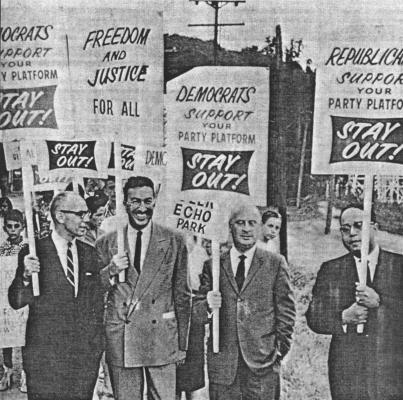
The administration began by attacking all the Navy bases, Rabb recalled, beginning in the South, from Norfolk to Charleston and then Galveston and points in between. All of the “For Colored” signs were taken down. “I thought I’d have a lot of trouble with Robert Anderson, (Secretary of the Navy),” said Rabb. “But the President had given me orders to move.” Then it was on to the veterans hospitals. “All the time I’m communicating with Powell and the President,” said Rabb. Then the biggest challenge, he recalled, desegregating the city of Washington itself. “If you recall, Ralph Bunche told Truman he couldn’t work in a segregated city like Washington. Eisenhower called in the leaders of the movie industry. He said ‘end Jim Crow in the theaters.’ We made it clear the law would be enforced.” Rabb says the desegregation of Washington was “a tremendous thing, done quietly. All a result of Adam Clayton Powell. What took place was far more important than people realized.”
It would not take long for Powell to drag the administration into another controversy. In the late winter of 1955, plans were being made by several third world, and communist countries, for a worldwide conference. It would be the first conference of its kind bringing together nations of color. The Eisenhower administration made a decision to boycott the meeting, fearing it would pander to communist ideas, and would serve little more than as an all out attack on the West. Powell, sensing a chance to begin a new and different kind of dialogue, announced that he would go. The administration told him not to go, told him he would not be allowed to go as a representative of the American government. Powell continued his threats.
There were high-level State Department briefings. Powell, an old newspaperman (he had founded a weekly in the 1940’s) said fine, he would not go as a Congressman, but as a newspaperman. He packed, and when he stepped off the plane in Manila, on his way to Bandung, in Indonesia, his press pass dangled from a piece of string around his neck. The Eisenhower administration was on edge.
“We thought he was going to chew the hell out of the United States,” recalled Congressman Tom Curtis, one of many congressmen who opposed Powell’s trip. Powell surprised. He talked up America, bragged about civil rights gains and the promise of things to come. The foreign press, poised for Powell to launch an attack upon the Eisenhower administration, now had a different story: Powell the patriot, flag-waver. It made for good copy. Powell returned stateside something of a hero, hailed by colleagues in Congress, emboldened anew by an international reputation, watched, with eve-widening eyes, by the Eisenhower crowd.
Adam Clayton Powell missed the 1956 Democratic national convention. “I had not been invited,” he said. Powell, and a few others, were upset by what he called the Democrats’ “wishy washy” position on civil rights that year. Joseph Rauh, civil rights attorney in Washington at the time, attended both the 1956 Democratic and Republican conventions. His feelings mirrored Powell’s, and there was little confidence in Democratic nominee Adlai Stevenson. “Stevenson’s position was very moderate on civil rights,” said Rauh. “I can see where Adam would have had a fit. Stevenson beat us down on civil rights. I went to the Republican convention and their platform stunk, too. But their convention platform was slightly better than the Democratic plank,” Rauh recalled.
Returning from Europe that autumn, Powell said he would “come down the gangplank” still undecided about the Stevenson-Kefauver ticket. It was a strange warning from a Democrat who had supported the Stevenson ticket in 1952. The Democrats always had used Powell as a vote-getter. He was a politician, but part celebrity, too. His smile could get votes.
On October 11, Powell was ushered into the White House for a meeting with Eisenhower. It lasted thirty minutes. Afterwards, a mob of reporters rushed into the office of James Hagerty, the presidential spokesman. It was announced that Powell would abandon the Democratic ticket in the presidential contest and support Eisenhower. The news was stunning. “I remember asking him if he was sure,” recalled Rabb, cabinet secretary. Powell gave his reasons for switching as liking Eisenhower’s approach to civil rights and his “prestige” in the Western world. He immediately said he would form an “Independent Democrats for Eisenhower” organization. The Republican National Committee said it would set up a series of engagements for Powell around the country, and its officials laughed at the dilemma the Democrats were suddenly in.
Democratic retribution against Powell was swift. Emmanuel Cellar, the powerful Democratic congressman from Brooklyn, said Powell was nothing but a “turncoat.” “In the next Congress, if he is elected,” said Cellar, referring to Powell, “He should be deprived of his seniority rights.” Two employees who Powell had sponsored on the House payroll were fired. His patronage privileges were yanked. “Let’s put it this way,” said Harry R. Sheppared, patronage committee member, “the patronage committee is charged with taking care of Democrats. Period.” Congressman Wayne Hays suggested that Powell be stripped of his seniority on the education and labor committee. Sam Rayburn, Speaker of the House, nixed the idea.
Powell was not the first Democrat to bolt his party; the southern Democrats, known as Dixiecrats, turned the practice into an art. The New York Post made note of the double-standard facing Powell. “Do the Democratic congressional chieftains consider Powell’s offense a high crime and (John Bell) Williams’ a minor eccentricity?” the Post asked in an editorial. “Is Powell punished because he is a Negro and Williams let off because he has the best Mississippi connections? The questions are ugly; but they are inevitably provoked by the double standard employed.”
Reaction in Harlem, Powell’s congressional district, was mixed, though one detected an admiration in his maverick decision. To many in Harlem, Powell’s decision was what made him Powell: he was the kind of man who saddled his own horse, chopped his own trees, made his own decisions. Many of his churchgoing flock were old enough to remember when the word Republican was cherished among blacks. Abraham Lincoln and Frederick Douglass and Adam Clayton Powell Senior were all Republicans. Still: “He has made a career by selling himself to whatever party–Democratic, American Labor or Republican–he thinks or hopes will give him the best chance of personal advancement and profit,” Formington Taylor, Harlem activist, said at the time. The Amsterdam News, Harlem’s black weekly, hushed Powell’s critics and urged support for his decision.
Powell, the politician-preacher-celebrity, began a sweep of cities on behalf of Eisenhower. It was a curious swing. At a rally in Newark he vowed to “speak the truth and take the consequences even if it means the end of my political career.” He admonished blacks who planned to vote Democratic as “traitors to their own race.” Autographs signed, he’d race to the next rally.
“Contributions by President Eisenhower in the field of civil rights have been greater than any other president,” he said to a throng in Gary, Indiana, dismissing the accomplishments of Lincoln, Truman and Roosevelt in that one sentence.
The audience in Detroit bordered on hostile. These were Roosevelt blacks and there were catcalls. “My quarrel is not with Northern Democrats,” Powell tried explaining. “My quarrel is with the Dixiecrats.”
A rally in Los Angeles was delayed two hours. There were pickets waiting for Powell. Law enforcement officials huddled to insure his safety. “Anyone who is endorsed on the one hand by Eleanor Roosevelt and on the other hand by Eastland or Mississippi,” he hollered, referring to Stevenson, “has to be either a hypocrite, a liar, a double-talker or a double-dealer.” He had to be led out of Los Angeles by police escort.
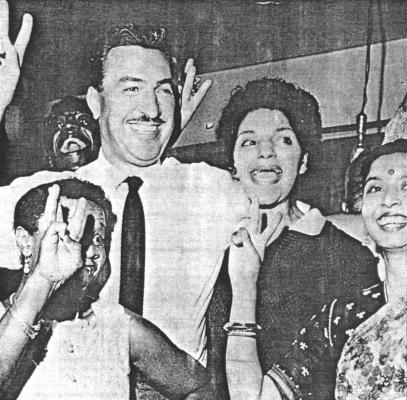
Thirty-two percent of the black vote went toward the Eisenhower victory that winter. It was a far bigger vote than expected. Powell had swung votes. He had also gained enemies. His future looked precarious. He threatened, as he was wont to do every year or so. to leave politics. He had, after all, the church in Harlem. His wife, the jazz pianist Hazel Scott, commanded huge concert fees. There was money in the bank. But it was politics that made the horse run. Nothing else could match the glory of it.
Shortly after Eisenhower’s second victory, Powell began inching his way back into the graces of the Democratic party. Eisenhower was now slowed by illness, aloof from civil rights. Powell offered Eisenhower a solution to his current woes. “As one who respects your life and devotion to our country, may I respectfully request that you withdraw immediately.” Powell wrote to the President. “I know that we in the free world need your leadership and the luster of your prestige name, but you have given your all, all your life, and I am positive that you are now entitled to spend the balance of your life relaxed and happy with your loved ones. In the meantime, my prayers.” Eisenhower ignored the advice.
In January. 1958, Powell stated that Eisenhower and Nixon “had failed the Negro.” He complained that civil rights was no longer a priority with the administration.
Powell’s conversion went unnoticed in New York City, where leaders of Tammany Hall, especially Carmine DeSapio. were plotting Powell’s political demise. Earl Brown, a Life magazine editor. was picked to run against Powell in the primary, with the financial backing of Tammany Hall. Brown was a quiet, well-respected man. But he lacked dazzle and a presence. No matter, the intensity of the Tammany Hall effort to oust Powell was so strong that Powell turned to J. Raymond Jones, a Harlem political operative known as “the fox” to manage his campaign.
Savvy as Jones might have been, and his addition did add a touch of drama to the campaign, nothing compared to Powell’s followers at the Abyssinian Baptist Church. The majority of members were women, and they were combative and they were not about to let their Adam, whose daddy they had known and loved, lose. Powell beat Brown badly, crushing Tammany Hall’s effort, and putting the powerful political machine on notice. “Carmine has no more leaders in Harlem,” Powell said about DeSapio. Powell was being referred to as the “most powerful political figure ever produced in that community.”
His notoriety never higher, Powell was rolling now. and began preparing for the 1960 Democratic national convention. He did not like Senator John F. Kennedy of Massachusetts, urging that delegates “repudiate” Kennedy’s efforts to get the nomination. Powell did not like Kennedy’s civil rights positions, nor did he like the way southerners had coveted Kennedy. Powell expressed support for Senate majority leader Lyndon Johnson. Heading to the convention in Los Angeles, Powell already was in trouble: the NAACP told him they could not support Johnson, a southerner. Johnson, the shrewd Texan, wondered why people would not refer to him as a “southwesterner.”
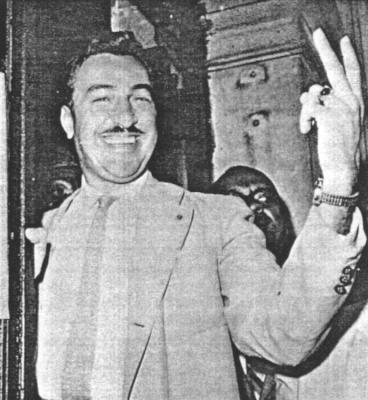
The Democratic nomination went to Senator Kennedy, and Johnson became the vice-presidential nominee. Powell was back in the Democratic fold, his 1956 defection was history, old news. Powell hit the road campaigning hard against Republican nominee Nixon, and the Democrats would marvel at his ability to draw crowds, to drum up enthusiasm, to make politics work. During his speeches, Powell held high in the air a blown-up copy of a restrictive covenant of Nixon’s, which meant that when Nixon sold his house it could not be sold to a black or Jewish family. The word “shame” was scrawled on the covenant. The crowds got a hoot out of that. Powell, onetime supporter of Eisenhower-Nixon, was now a mortal enemy to Nixon and the Republicans.
“Here’s a man that’s got everything,” Eisenhower had once said about Powell. “He’s handsome, he’s brilliant. But goddammit, he’s tricky.”
Kennedy would win the election in a squeaker. Changes were expected, and promised. America, which so many critics thought was lumbering in a kind of 1950s inertia, would now lurch forward. This young president would take her. Democratic lawmakers who had languished under Eisenhower for eight years were ready to go to work. Adam Clayton Powell wasted no time in reminding Kennedy aides that he was the first well-known Protestant clergyman to come out in support of the Catholic president. Within a matter of months Powell would assume chairmanship of the powerful education and labor committee. He promised bold legislation. He was sitting pretty and knew it.
©1988 Wil Haygood
Wil Haygood, on leave from The Boston Globe, is examining the life of Adam Clayton Powell, Jr.

